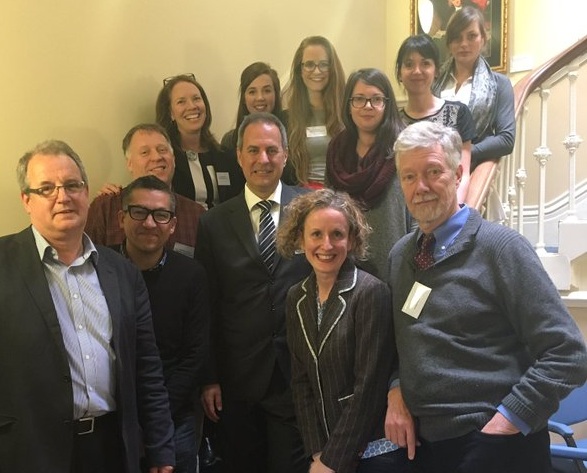
HAS-UK Kick-Off!
Beginning in the era of the American Revolution, and even with the Quakers before that, the abolition movement was a transatlantic phenomenon. Whether in the era of Anthony Benezet and Granville Sharp or of William Lloyd Garrison and Thomas Fowell Buxton, abolitionists found that differences in the political cultures in Britain and America posed opportunities as well as challenges for the cause. Following in their footsteps, in recent months Historians Against Slavery has been examining ways of expanding and organizing our activities in the United Kingdom.
To that end, on Friday 29 April, we as Co-Directors of HAS met with a group of about 30 British scholars, museum leaders, and activists to discuss the formation of HAS-UK. HAS board member and superstar organizer Zoe Trodd and her Antislavery Usable Past network convened the gathering at the Wilberforce Institute for the study of Slavery and Emancipation (WISE) at Hull University. After we offered a brief history of HAS and answered a variety of questions, we listened to Kevin Bales, a professor at WISE and overall rock star in the movement; Richard Benjamin, director of the International Slavery Museum; Aidan McQuade, Director of Anti-Slavery International; and Jean Allain, who is working to establish Lawyers Against Slavery. Stacey and I came away from this gathering feeling energized by the potential for HAS-UK, and struck by three ways in which HAS-UK may well end up looking different from HAS in the US.
First, academics in the UK are expected to establish the “impact” of their work, and so an organization like HAS – which is focused on employing scholarship to support human rights – is attractive. In other words, the academic context in the UK is very friendly to scholarly involvement in activism.
Second, the diverse participation in the gathering suggested that HAS may be able to make inroads quicker in some areas there than in the US. The UK’s academic culture seems much better integrated with what they call the “heritage community” (museums, historical sites, that sort of thing) than US academic culture, so there are great opportunities for partnerships in this regard. The interest of antislavery NGOs like Anti-Slavery International, and discussion at the meeting of how the media in the UK loves to cover the activities of such NGOs, suggests other opportunities for HAS in the UK. We in HAS have always been interested in partnering with antislavery organizations and people in the heritage community, as illustrated by our ongoing collaborations with the National Underground Railroad Freedom Center. But such immediate and high-energy and –profile partnerships in the UK may give us the momentum we need to expand our efforts in this direction in the US.
Third, in our opening statement we spoke of HAS founder James Brewer Stewart’s repeated point that the contemporary antislavery movement too often loses or marginalizes African-American voices and history, and that HAS should never lose sight of that. It was interesting to watch that theme unfold in this meeting in Hull because of the different racial scenario in Britain. Linking antislavery to people of color there means connecting with hot-button questions such as reparations for slavery as well as the legacy of the British Empire. It seems that the question of reparations is analogous in the racial politics of Britain to mass incarceration / Black Lives Matter in the US; in both instances, any engagement with contemporary slavery that ignores such questions risks being marginalized politically and impaired in impact.
We look forward to seeing how HAS-UK unfolds given these differences from the US context for HAS’s work. Given the energy, intellectual gravity, and good will of the people gathered at the Wilberforce Center last month, we are confident that this unfolding will produce multiple benefits.
Matthew Mason, Brigham Young University
Stacey Robertson, Central Washington University
Co-Directors, Historians Against Slavery
